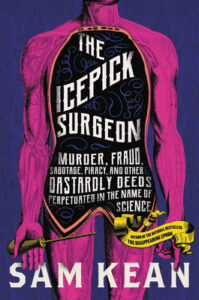
![]()
The Icepick Surgeon: Murder, Fraud, Sabotage, Piracy, and Other Dastardly Deeds Perpetrated in the Name of Science
Sam Kean
“…when we sacrifice morals for scientific progress, we often end up with neither.”
Scientific research and testing has brought us incredible knowledge about everything from biodiversity to treating and curing disease. But dig through the notebooks or peek under that sterile sheet and you’ll discover dark truths. The foundation of science is built partly on the backs of enslaved and impoverished people, feuds between the fame-hungry, and carefully-worded justifications of unethical or illegal behaviors. And if you think the science of the past is tricky, consider how someone could fake results with AI, meddle with DNA subpoenaed from genealogy websites, or bring back the Neanderthal without considering the implications.
Nothing ruins your pride in humanity’s accomplishments quite like a history book. The facts themselves are horrifying enough, but what kept me up at night was the questions Kean used those facts to ask: Is it ethical to use the results of unethically-gathered data? Is breaking the law or hurting a small number of people acceptable if the research goes on to help thousands? I’m not sure anyone knows the answers, but it should certainly serve as a warning to scientists that sacrificing morals on the altar of progress is probably a bad idea.
Read this if you like important, challenging history and loved your last ethics class. Just, um…maybe skip the chapter about the dogs.

![]()
The Bandit Queens
Parini Shroff
“She resented being put in a position where those were her choices: violence or violation. She didn’t want to be built to endure, a long-suffering saint tossed by the whims of men. She wanted, for once, not to be handed the short end of the stick by a system that expected gratitude in return.”
Geeta absolutely did not kill her husband — but she must admit there’s certain perks to being considered the village murderer. She’s “respected” (read: feared), has started her own business, and is finally beginning to see herself as worthy of what she wants. But things get complicated when other women start arriving on her doorstep asking for her “expertise” in getting rid of their own terrible husbands. Soon Geeta’s hard-fought freedom and safety are at stake, in more ways than one. In a culture where a woman’s value is determined by her husband, children, and wider community, can Geeta forge another path?
I picked this up thinking it would be a light read. While there were some moments of levity, the story was much deeper and darker than I anticipated — and I loved every second of it. It was great seeing Geeta’s transformation from a victim of abuse to a woman who knows her worth and will fight tooth and nail for herself. The story went in directions I didn’t expect and explored themes like friendship and independence in thoughtful ways. Some readers have said that it paints a stereotypical and unfair portrait of India culture, but I think the author has created an excellent setting that makes it easy to explore feminism through a different lens than I’m accustomed to.
Grab a copy if you like thrillers filled with strong women.
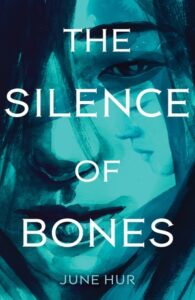
![]()
The Silence of Bones
June Hur
“There is one lesson all who enter the capital will learn: evil comes from the unfulfilled need for significance.”
16-year-old Seol is a damo, lower than even the slaves of Korean society. Her circumstances have led to her indentured servitude with the police bureau, where she is the only one permitted to touch the bodies of female murder victims. Her quick thinking has led to an unlikely bond with a popular inspector — but as more bodies are discovered, suspicion casts a shadow over the man she has come to respect. Will Seol’s curiosity be their savior, or their undoing?
I’ve been trying to pinpoint why this book didn’t do it for me, and I think it comes down to the author trying to do too much; it’s her debut novel, and it shows. This is a story about gender, class, religion, and the clash of old and new. There are a lot of characters, most of which felt so uniformly bland that I had a hard time differentiating them. The afterward clued me into the historical context that Hur seems to be most fascinated by, but it just made me think she should have either focused on that or written a police procedural that covered the other elements of the story. It’s labeled YA but I’m not really sure why — perhaps because the main character is 16 and there are some themes related to family. The premise lured me in, but the execution left much to be desired.
Give this a try if you like your YA dark and don’t mind a messy plot.
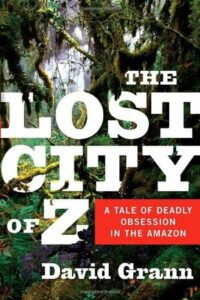
![]()
The Lost City of Z: A Tale of Deadly Obsession in the Amazon
David Grann
“…ordinary people driven to do extraordinary things — things that most of us would never dare — who get some germ of an idea in their heads that metastasizes until it consumes them.”
In 1925 the renowned explorer Percy Harrison Fawcett, his son Jack, and a friend embarked on a grand adventure into the heart of the Amazon. What happened to them remains a mystery almost a century later. Did they find the lost civilization that Fawcett was convinced existed, or was their fate something more grisly and predictable?
David Grann has been one of my auto-read authors for several years, but it’s only in the last few months that I’ve dug into his backlog. The Lost City of Z was his first book (pub. 2009), and I was hooked from page one. Fawcett was a complex figure, one of the last “gentleman explorers,” and it’s clear that Grann is just as fascinated as I was. There are parts of the Amazon we can’t map today — I can’t imagine exploring it on foot while everything around you is doing its best to eat you alive. And, like many of the “Fawcett freaks” who have tried uncovering the truth, I too wonder whether the lost city may be just around the next bend in the river…
Add this to your TBR if you like history, adventure, and don’t mind a surplus of maggots-in-wounds references.
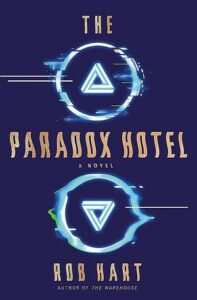
![]()
The Paradox Hotel
Rob Hart
DNF
“A few people have said they’ve seen a woman who resembles her roaming the hallways at night. Which any other day I would call bullshit, but I see my dead girlfriend in the bathroom, so who am I to talk?”
Being the in-house detective at a hotel that specializes in time travel is surprisingly boring 95% of the time — it’s the other 5% that’ll get ya. January Cole is rapidly becoming Unstuck in time, uncertain whether what she’s seeing is in the past, the future, or actually happening now. Bad weather has trapped a douchey Venture Capitalists, a shady politician, and three velociraptors in the hotel, and it turns out only January can see the dead body someone left in a room on the fifth floor. Can January nab a killer who’s hiding in plain sight before her mind unravels for good?
This was technically a DNF for me, since I lost the thread about halfway through and only skimmed the last few chapters. It was too much — too many characters, too many plot lines (ghosts! mystery! murder! politics! existential crises!), too much information. My enjoyment waned the further into the story I got, and in the end I simply lost interest.
Pick this up if you enjoy speculative fiction or wibbly-wobbly-timey-wimey stories.
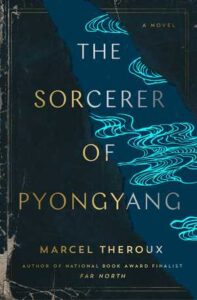
![]()
The Sorcerer of Pyongyang
Marcel Theroux
“It was a moment that Cho Jun-su would replay in his imagination for the rest of his life. In years to come, he would joke that it was like a celestial object falling from the sky to be discovered by some bewildered nomad and made the centerpiece of a new religion.”
Finding the right book at the right time can be life-changing, especially when you live in one of the most isolated countries in the world. When middle-schooler Jun-su finds a forgotten copy of The Dungeon Master’s Guide, he is introduced to worlds far beyond North Korea. But soon it becomes clear that his discovery has put him directly in conflict with everything he was raised to believe — and the government that can decide whether he lives or dies.
Like many readers, I picked this up because of the Dungeons & Dragons connection; unlike many readers, I appreciated that gameplay wasn’t the actual focus. I love how Theroux made it the bedrock of the story, showing how Jun-su’s learning the concepts/themes and how to play impacted his decisions throughout his life. That said, the plot itself was a little predictable, and I found the combination of third-person and first-person distracting. I didn’t need a narrator (who we don’t meet until the last chapter) interjecting their personal opinions and observations on things I’d rather have interpreted on my own.
Read this if you like character studies, D&D (without the nitty-gritty gameplay), and learning about a country most Americans never even think about.

![]()
100 Pep Talks
Elise Blaha Cripe
“For 100 days, I wrote and shared a daily pep talk on Instagram with the hashtag #100daysofelisepeptalks.”
I got this as a gift a couple years ago, and finally found a way to use it by folding it into my daily journaling and Stoicism practice. It wasn’t life-changing, but it was a nice way to add positivity to my mornings.
A good thing to have on your shelf if you’re into daily habits, journaling, or meditation.
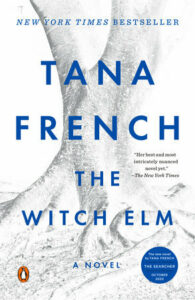
![]()
The Witch Elm
Tana French
“The wych elm’s whole crown was gone, only the trunk left, thick stubs of branches poking out obscenely. It should have looked pathetic, but instead it had a new, condensed force: some great malformed creature, musclebound and nameless, huddled in the darkness waiting for a sign.”
PR specialist and charmer Toby’s lifelong good luck runs out abruptly one night when he’s beaten nearly to death. Soon after his release from the hospital, he decides to hunker down with his uncle at Ivy House, the family’s ancestral home — hoping some peace and quiet will help his memory and loosen the clutches of his newly-acquired PTSD. All hope of that collapses when the family finds a human skull on the property. As detectives dig into the case and the past, Toby begins to realize that his life may not be as lucky as he thought it was.
This book kicks off with all the atmospheric vibes: fear, a creaky old house, a garden gone to seed, and of course a skeleton, creepy tree, and a narrator with memory problems. I’m not normally a fan of the “slow burn,” but when it comes to spooky reading that’s practically the only way to do it right. I spent the first half of the book on tenterhooks, and it was awesome. Unfortunately what author Tana French started with a bang, she let end with a whimper. Her narrative choices made the second half drag, and while the ending was unexpected I don’t think it made the most sense. The overall story was a bit of a letdown, which I hate because French is such a great writer. Her older series have better ratings, so I might try one of those someday.
Pick this up if you like unreliable narrators, books with well-crafted/described settings, and prefer suspense over horror.
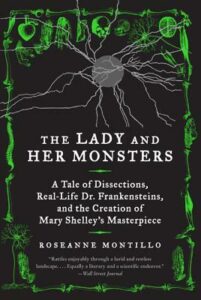
![]()
The Lady and Her Monsters: A Tale of Dissections, Real-Life Dr. Frankensteins, and the Creation of Mary Shelley’s Masterpiece
Roseanne Montillo
“On the night of Mary Godwin’s birth…a storm descended upon the city of London that was later remembered as one of the most awesome displays of thunder and lightning anyone had ever seen.”
It’s understandable that the first true science fiction novel was written when the war between science and religion raged its hardest; what makes less immediate sense is the fact that it was penned by an 18-year-old woman whose only claims to fame were her feminist mother and numerous titillating scandals. The Lady and Her Monsters is a deeper look at the historical context that made the early 19th century ideal time for Frankenstein — and for the woman who created him.
Like many stories we now consider “classic literature,” Shelley’s novel was published at a time when things were a little weird. Scientific experiments and discoveries were beginning to contradict historical religious beliefs, and electricity in particular was seen as critical to the future. Personally, Shelley’s life was filled with scandal, loss, and uncertainty. I like how Montillo showcased Frankenstein as the inevitable result of all these stories and influences. The facts weren’t new to me (body snatchers, dissections, lightning experiments, etc.), but the way they were put together shed new light on the subject.
A nice read for fans of Montillo and the history of literature. For a more immersive, story-based telling of the story behind Frankenstein, try A Storm in the Stars.
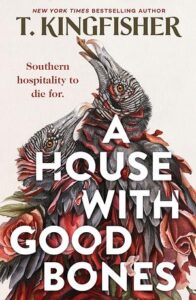
![]()
A House with Good Bones
T. Kingfisher
Book club
“Strange, the powers you find sometimes, in a garden at the end of the road.”
Sam Montgomery is worried about her mother. The bad word-using, bright color loving, faith-rejecting 50-something is acting weird — moderating her language, painting the entire house an excruciatingly boring shade of ecru, and insisting on prayers before mealtimes. It’s like she’s becoming her own mother: the prim and proper (and also awful and dead) Gran Mae. Family roots run deep in the South, and dark pasts never stay buried for long. Soon it’s up to Sam, her mother, a local handyman, and the neighborhood “old witch” to discover the truth before the house on Lammergeier Lane (or what lurks beneath it) swallows them whole.
Kingfisher (Ursula Vernon) is quickly becoming an auto-read author for me. I started easy with A Wizard’s Guide to Defensive Baking, devoured Nettle & Bone last year, and have moved rapidly into some amazing spooky shit with my third selection. This is just a good book, nicely balancing humor and horror. I’d like to have seen a bit more character development, but circling vultures and shiver-inducing creepy crawlies make up for it. This was one of my book club’s selections for October, and I’m very interested to see what the group thinks.
Read if you can’t resist a good Southern Gothic horror story.






